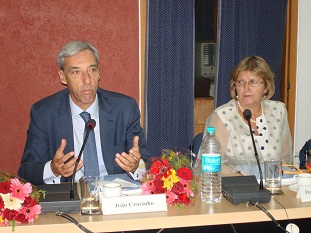Events of ADRI Patna

A six-member ambassadorial delegation of the European Union (EU) visited the Asian Development Research Institute (ADRI), Patna on Wednesday, October 30, 2013. The delegation was at ADRI to participate in an interactive session titled ‘Social and Economic Trends and their Impact on the Political landscape in Bihar' and organized by ADRI.
H.E. Mr. João Cravinho, Ambassador of the European Union, who had visited ADRI a couple of months back too, led the delegation that was on a 3-day visit to Bihar. Other five members of the high-profile delegation included H.E. Mr. Pierre Vaesen, Ambassador, Embassy of Belgium; H.E. Mr. Jorge Roza de Oliveira, Ambassador, Embassy of Portugal; H.E. Dr. János Terényi, Ambassador, Embassy of Hungary; H.E. Mrs. Darja Bavdaž Kuret, Ambassador, Embassy of the Republic of Slovenia; and H.E. Anne Marchal, First Counsellor, Head of Section, Political Affairs, Delegation of the European Union to India.
Responding to a series of queries from the delegation, Dr Shaibal Gupta, member-secretary of ADRI, said that after 2005, the ‘coalition of subalterns' graduated to the ‘coalition of extremes' in terms of ‘social identity', and not in terms of ‘politics', in the interest of the state. ‘Special Category' status is wanted by the people of this state for two major reasons: one, for a better devolution of fund to the state, and two, for attracting tax breaks which, in turn, would invite more and more private industry. "The nomenclature for ‘Special Status' may be different, but the fruits would never be," clarified Dr Gupta.
Mr Chinmaya Kumar of the IGC in his presentation said Bihar has seen a dramatic turnaround of its socio-economic scenario during the present regime led by chief minister Nitish Kumar because of a whole bunch of reforms brought in the domain of public service delivery and innovations in governance.
Prof PP Ghosh delineated the historical and political reasons behind the slow growth of society and the state in the past.
"Biharis have a will to survive through many challenges and they are bound to be successful despite having a feudal past," said Professor Mukund Das, the Director of the CIMP. Professor Das had many words of praise for the Nitish Kumar-led government for its efforts towards realizing the goals of social justice in the state.
Highlighting the role of sound legal and judicial institutions in spinning a country's overall socio-economic fabric, Professor A Lakshminath of the Chanakya National Law University (CNLU), Patna said "a healthy legal education system is bound to contribute to the establishment of a healthy legal system."
Professor Janak Pandey, the Vice Chancellor of CUB, said "the story of development in Bihar is actually that of human development. Quality academic research is key to development anywhere," Prof Pandey highlighted.
The interaction programme had a select group of participants from academia and industry, both.
Discussants included Mr Ghanshyam Tiwari from the IGC; Mr Rupak Kumar Jha from the Indian Institute of Technology (IIT), Bombay; Mr Ronald Abraham from the IDInsight amongst others. Mr Shailendra P Sinha, Chairman, Confederation of Indian Industry (CII)-Bihar Chapter and Mr Satyajit Singh, Ex-Chief, CII-Bihar Chapter represented the industry in the state.
Professor PP Ghosh conveyed the vote of thanks.